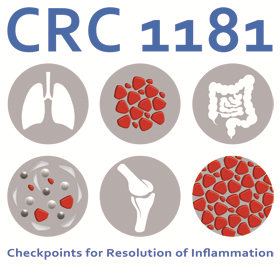Learning about diseases and their treatment through gaming
New module in the inflammation game
Gambling until the doctor arrives: The inflammatory game “Game In Flame – Battle Against Inflammation” explains how our immune system works and how drugs work for inflammations and autoimmune diseases. Now the strategy game has been expanded to include a module on rheumatoid arthritis, after gout, intestinal inflammation and asthma. The player controls a fatal quartet consisting of macrophages, T-cells, B-cells and the messenger TNF with the targeted use of drugs. The browser game was developed as part of the Collaborative Research Center (SFB) 1181 “Checkpoints for Resolution of Inflammation” under the direction of the Medical Clinic 3 – Rheumatology and Immunology (Director: Prof. Dr. med. univ. Georg Schett) in order to provide playful information about the latest findings from inflammation research.
A multitude of immune cells work together to maintain the health of the body. But enemies lurk everywhere: We inhale viruses or take pathogens via contaminated food. To protect us, the immune system reacts with an inflammation. In the strategy game “Game In Flame” the user gets an insight into this fascinating world of the body’s own defense. Since its launch a year ago, more than 100 people have been skilfully combating gout attacks every day, protecting the epithelial barrier in intestinal inflammation, preventing an asthma attack and, most recently, eradicating centres of inflammation in rheumatism. “In the new game world, you not only learn about the different immune cells, but the game also explains the different drugs and their mechanisms of action according to the current treatment guidelines,” explains Prof. Schett.
Knowledge helps to optimze behavior
Chronic inflammatory diseases such as rheumatoid arthritis, Crohn’s disease or asthma affect millions of people – including many young people. Pain, destruction of organ function and a reduced quality of life are essential consequences of these diseases. Up to now, chronic inflammatory diseases cannot be cured, but targeted, immunomodulating drugs and therapies can reduce the signs of the disease. “Game In Flame” contributes to health education about molecular mechanisms of action and treatment approaches and raises awareness of the long-term pursuit of therapies. For example, it offers players an “Immuxikon” that provides information on the properties and functions of immune cells and drugs. With the rheumatism update the game was extended by a disease and is now also available in English online (www.gameinflame.de) and for mobile devices as an iOS app and as an Android app.
Further information:
Sandra Jeleazcov
Tel.: 09131 85-39109
sandra.jeleazcov@uk-erlangen.de




